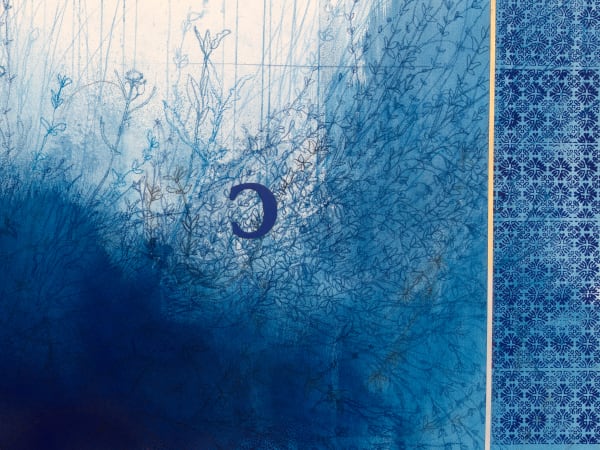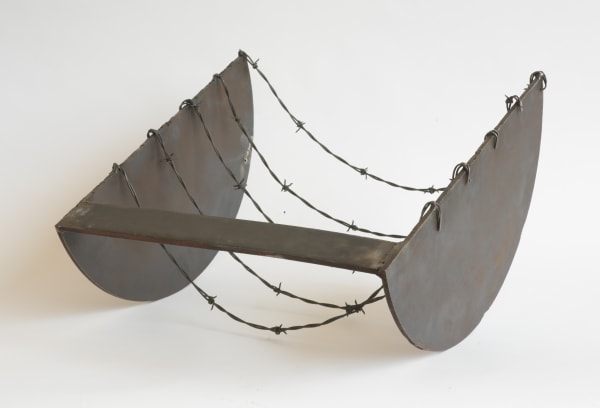Frieze New York
The Shed | 545 West 30th St | New York | Booth B14
Preview (invitation only): May 17, 2023
Preview: May 18–19, 2023
Public Days: May 20–21, 2023
Alexander Gray Associates presents works by Ricardo Brey, Bethany Collins, Melvin Edwards, Harmony Hammond, Jennie C. Jones, Steve Locke, Lorraine O’Grady, Ronny Quevedo, and Joan Semmel. Featuring a range of abstract and figurative paintings, sculptures, and drawings, the Gallery’s presentation celebrates artistic approaches that challenge conceptual and formal conventions.
In recent work, Harmony Hammond focuses on materiality and the indexical, suggesting topographies of the body. Paintings like Bandaged Grid #12 (Big Gold) (2022–23) and other related canvases currently on view in the artist’s one-person exhibition at the Gallery’s Chelsea location feature patches of fabric layered over grids of grommets. For Hammond, this approach evokes the bandaging of a body. Similarly, Melvin Edwards’s sculptures capitalize on what the curator Catherine Craft calls “the multivalent practical possibilities of . . . material.” Constructed from salvaged industrial elements, the artist’s freestanding sculpture Diallo (1999) is at once scrap, tool, and weapon. The work pays tribute to Amadou Diallo, an African immigrant who was wrongfully shot and killed by police officers in the Bronx in 1999.
Since the 1970s, Joan Semmel has centered her practice around representations of the body from the female perspective. While her previous use of the camera was to document herself from her own viewpoint, works like On the Easel (2001) mark the first time Semmel purposefully posed in front of the mirror with a camera to challenge the objectification and fetishization of the female form. While Semmel’s canvases are distinguished by the artist’s “experience of femaleness,” Steve Locke’s paintings examine themes of male desire, vulnerability, and sexuality. cruisers (cinema) and cruisers (vest) (both 2022) capture intensely intimate—and potentially dangerous—moments shared between anonymous men, who are connected by the act of “looking.”
Eschewing figuration, Ronny Quevedo’s practice meditates on themes related to identity by reenvisioning sports iconographies. In intimately scaled abstractions like astro (2021) and el crack (2022), Quevedo constructs compositions that recall gameplay strategy diagrams to examine the connection between play, movement, and migration. Like Quevedo, Ricardo Brey incorporates historical and cultural legacies related to his autobiography into his visual vocabulary. Works on paper like Middle Branches and I hear the light (both 2021) range in hue from cerulean to lapis lazuli; their shimmering azure grounds evoking the freedom and limitless expansiveness of the ocean. Also exploring issues surrounding identity, Lorraine O’Grady’s The Strange Taxi, From Africa to Jamaica to Boston in 200 Years (1991/2019) presents the Black body as the literal ground on which history acts and is unexpectedly modified.
Making her debut with the Gallery, Bethany Collins’s nuanced works on paper examine the complicated relationship between race and language. In Antigone: 1998 / 2015 (2023), Collins presents hand-written passages taken from Sophocles’s play blown up to a monumental scale. As in her ongoing Odyssey and Aeneid series, Collins invests the modernist act of erasure with a charged physicality by using her spit to erase all the text except for select passages of the Athenian tragedy. Meanwhile, in new Acoustic Paintings like Dense Tone, Break (2023), Jennie C. Jones continues to explore the perception of sound within the visual arts. Encouraging viewers to anticipate the presence of sound, Jones states that paintings like Dense Tone are always “active.”
Reflecting the Gallery’s engagement with artists working across cultural, social, and political spheres, these nine artists advocate for an expanded understanding of material and process through thoughtful, open-ended works that Hammond argues “participate in multiple narratives.”










